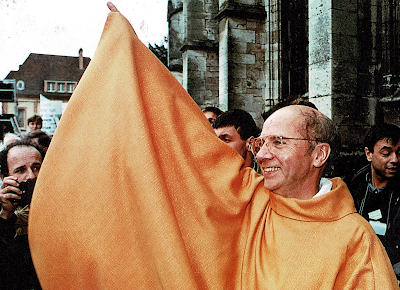"Homosexuals will precede us into heaven", maintained Bishop rehabilitated by Pope
In the contentious 1980s, Jacques Gaillot was the "enfant terrible" of the French bishops - until it became too much for Pope John Paul II. After his ouster, Gaillot moved to the then still young internet, where other left-wing dissidents gathered in his "virtual diocese". Now, at the age of 87, Gaillot has died of cancer.
Impeachment and declarations of solidarity
When Jacques Gaillot celebrated his farewell service in Evreux in 1995, the town in Normandy was in a state of emergency. People travelled by 300 buses and three special trains to assure him of their solidarity. The "black sheep" among the French bishops had, in the eyes of the Vatican, crossed the line too often with notorious insubordination. The defrocked bishop of Evreux was henceforth only the titular bishop of a bishopric that had perished in the fifth century: Partenia in present-day Algeria.
The unusual, harsh and - according to the Bonn church law expert Norbert Lüdecke - legally at least questionable measure triggered protests at home and abroad. At the time, Gaillot warned against a "church of exclusion" and pleaded for a "church of the excluded". For all his criticism of the Vatican, however, the controversial bishop opposed turning away from the Church. "Let us give it a future, each in his own way," he said in his farewell sermon.
"Bishop of the excluded"
There had been friction between Gaillot and his confreres long before the ouster. The short and lanky man with the metal glasses regularly caused offence with TV appearances in the 1980s when he criticised celibacy or the church's attitude to homosexuality, AIDS or France's nuclear deterrent. In an interview with the men's magazine "Lui", he called sexual intercourse "great and beautiful". And in an article for a French homosexual magazine, he wrote: "Homosexuals will precede us into heaven."
After his ouster, Gaillot remained in the reputation of a "bishop of the excluded". In France, he fought for the rights of the unemployed, the homeless, prisoners and illegal aliens. He was occasionally called upon as a mediator, for example when "illegals" argued with the authorities about the right to stay. A trip to Iraq shortly before the start of the war in March 2004 also caused a stir.
Gestures of reconciliation
In 2000, there were gestures of reconciliation with the then president of the French Bishops' Conference, Cardinal Louis-Marie Bille. But apart from the assurance to remain brothers and to be united in the church, hardly any practical consequences followed. In Church circles, it was said that Gaillot had soon afterwards again angered his confreres with unfriendly remarks. Cardinal Joachim Meisner of Cologne maintained his ban on Gaillot until the end.
Thus he remained present to a wider public, especially on the internet. He founded the "first virtual diocese", which went online at www.partenia.org one year after his ouster, first in French, later also in German, among other languages. After a decade and a half, Gaillot withdrew there too in 2010.
Since then it has been rather quiet about him - and he would almost have become a case for church historians if Pope Francis had not brought him back to consciousness in a spectacular gesture in 2015. He received Gaillot, who was almost his age, shortly before his 80th birthday for a 45-minute "private conversation" in the Vatican. A confidant of Gaillot spoke afterwards of a "meeting of like-minded people".
With regard to the blessing of remarried divorcees or homosexual couples, the Pope had smiled and said: "God's blessing is there for everyone." And on care for refugees and migrants, one of Gaillot's central tasks since his deposition, Francis had stressed: "Migrants were and always are the 'flesh' of the Church." Gaillot himself said after the meeting that he now felt "rehabilitated". And it is probably in this feeling that he has now died.










.jpeg)

Comments